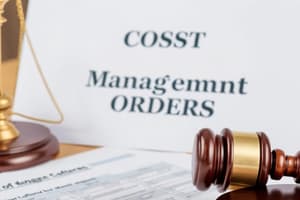Podcast
Questions and Answers
What is one of the key elements introduced in the CPR 1998 regarding case management?
What is one of the key elements introduced in the CPR 1998 regarding case management?
- The prioritization of cases based on their complexity
- The duty to minimize court appearances
- The introduction of a mandatory timeline for case resolution
- The duty to manage cases actively (correct)
Which rule gives the court a broad range of case management powers?
Which rule gives the court a broad range of case management powers?
- r 3.4(2)
- r 9.6
- r 1.4
- r 3.1(2) (correct)
In which scenario may a party’s statement of case be struck out?
In which scenario may a party’s statement of case be struck out?
- If it is submitted digitally
- If it presents a compelling argument
- If it fails to comply with a court order (correct)
- If it includes excessive legal jargon
What may be included in the consequences for a party not following the court's rules?
What may be included in the consequences for a party not following the court's rules?
Which track is typically associated with small claims?
Which track is typically associated with small claims?
What role does a case management conference serve in intermediate and multi-track cases?
What role does a case management conference serve in intermediate and multi-track cases?
What is the purpose of a directions questionnaire in case management?
What is the purpose of a directions questionnaire in case management?
What does the court need to consider when allocating a case to a particular track?
What does the court need to consider when allocating a case to a particular track?
What must parties explain if they have not complied with the Practice Direction on Pre-Action Conduct?
What must parties explain if they have not complied with the Practice Direction on Pre-Action Conduct?
Which tracks can parties choose between during case management?
Which tracks can parties choose between during case management?
What is one way a party in default can obtain relief from a cost sanction?
What is one way a party in default can obtain relief from a cost sanction?
What is the primary criteria for allocating a case to a particular track?
What is the primary criteria for allocating a case to a particular track?
Under what condition can parties agree to extend the time for compliance for up to 28 days?
Under what condition can parties agree to extend the time for compliance for up to 28 days?
If parties disagree on track allocation, what must they provide?
If parties disagree on track allocation, what must they provide?
What discretion does the court have when no formal application notice has been issued?
What discretion does the court have when no formal application notice has been issued?
What sections of Part D deal with the complexity band of the case?
What sections of Part D deal with the complexity band of the case?
What must the court consider when deciding to grant relief from a sanction?
What must the court consider when deciding to grant relief from a sanction?
What should parties do if they have not reached an agreement about electronic document disclosure?
What should parties do if they have not reached an agreement about electronic document disclosure?
What information is required in section 9 regarding non-electronic documents?
What information is required in section 9 regarding non-electronic documents?
Which situation demonstrates the court acting of its own initiative regarding relief from sanctions?
Which situation demonstrates the court acting of its own initiative regarding relief from sanctions?
What is a key factor the court considers if there is a dispute about track allocation?
What is a key factor the court considers if there is a dispute about track allocation?
How should the court exercise its discretion in granting relief from sanctions?
How should the court exercise its discretion in granting relief from sanctions?
What can the absence of a formal application imply according to the court's discretion?
What can the absence of a formal application imply according to the court's discretion?
What is the maximum extension period for compliance agreed upon by the parties?
What is the maximum extension period for compliance agreed upon by the parties?
What does the last direction typically require the parties to do upon settlement of a claim?
What does the last direction typically require the parties to do upon settlement of a claim?
What is one of the factors the court considers when determining orders for disclosure?
What is one of the factors the court considers when determining orders for disclosure?
Which of the following is NOT an order related to disclosure that the court may consider?
Which of the following is NOT an order related to disclosure that the court may consider?
What must parties do to vary the dates for a case management conference?
What must parties do to vary the dates for a case management conference?
When can parties agree to vary directions regarding disclosure?
When can parties agree to vary directions regarding disclosure?
Which order allows a party to disclose documents they rely on while requesting specific information from others?
Which order allows a party to disclose documents they rely on while requesting specific information from others?
Which of the following is a requirement for the courts in relation to the disclosure process?
Which of the following is a requirement for the courts in relation to the disclosure process?
What is the consequence of a party agreeing to vary matters that change essential trial dates?
What is the consequence of a party agreeing to vary matters that change essential trial dates?
What may be a consequence if a party fails to comply with court-imposed directions?
What may be a consequence if a party fails to comply with court-imposed directions?
What is the norm regarding the exchange of witness statements?
What is the norm regarding the exchange of witness statements?
In fast track cases, what is the usual requirement for expert evidence?
In fast track cases, what is the usual requirement for expert evidence?
What may happen if the court believes certain issues are ready for trial?
What may happen if the court believes certain issues are ready for trial?
What might the court order regarding costs related to remaining issues?
What might the court order regarding costs related to remaining issues?
How does the court handle the postponement of trials?
How does the court handle the postponement of trials?
What must the court determine before allowing an expert to give oral evidence?
What must the court determine before allowing an expert to give oral evidence?
What does the court require regarding a single joint expert?
What does the court require regarding a single joint expert?
What is the primary purpose of the pre-trial checklist?
What is the primary purpose of the pre-trial checklist?
When should the pre-trial checklist be returned to the court according to the directions order?
When should the pre-trial checklist be returned to the court according to the directions order?
What action will the court take if no party files a pre-trial checklist?
What action will the court take if no party files a pre-trial checklist?
What must parties do prior to the trial regarding the trial bundle?
What must parties do prior to the trial regarding the trial bundle?
How much notice does the court typically provide for a trial date?
How much notice does the court typically provide for a trial date?
What happens if some parties file a pre-trial checklist but not all?
What happens if some parties file a pre-trial checklist but not all?
What contents should the agreed directions include?
What contents should the agreed directions include?
What must be done with the pre-trial checklist before filing it with the court?
What must be done with the pre-trial checklist before filing it with the court?
Flashcards
Case Management
Case Management
A principle in the Civil Procedure Rules (CPR 1998) requiring judges to actively manage cases to achieve justice efficiently.
CPR 1998 (Civil Procedure Rules)
CPR 1998 (Civil Procedure Rules)
A set of rules that govern how civil court cases in England and Wales are conducted.
Statement of Case
Statement of Case
A document outlining the key points of the plaintiff's case, including claims, facts, and legal arguments.
Striking out a Statement of Case
Striking out a Statement of Case
Signup and view all the flashcards
Court Sanctions
Court Sanctions
Signup and view all the flashcards
Allocation
Allocation
Signup and view all the flashcards
Directions Questionnaire
Directions Questionnaire
Signup and view all the flashcards
Costs Management
Costs Management
Signup and view all the flashcards
Relief from Sanctions without Application
Relief from Sanctions without Application
Signup and view all the flashcards
Sparing Relief from Sanctions
Sparing Relief from Sanctions
Signup and view all the flashcards
Extending Deadlines by Agreement
Extending Deadlines by Agreement
Signup and view all the flashcards
Appealing Cost Sanction
Appealing Cost Sanction
Signup and view all the flashcards
Overriding Objective in Relief from Sanctions
Overriding Objective in Relief from Sanctions
Signup and view all the flashcards
Appealing against Sanctions
Appealing against Sanctions
Signup and view all the flashcards
Extending Deadlines with Consequences
Extending Deadlines with Consequences
Signup and view all the flashcards
Considerations for Relief from Sanctions
Considerations for Relief from Sanctions
Signup and view all the flashcards
Pre-Action Protocols in Part C
Pre-Action Protocols in Part C
Signup and view all the flashcards
Case Management Track in Part D
Case Management Track in Part D
Signup and view all the flashcards
Claim Value for Track Allocation
Claim Value for Track Allocation
Signup and view all the flashcards
Complexity Band for Fast/Intermediate Tracks
Complexity Band for Fast/Intermediate Tracks
Signup and view all the flashcards
Electronic Document Disclosure (Multi-Track)
Electronic Document Disclosure (Multi-Track)
Signup and view all the flashcards
Non-Electronic Document Disclosure
Non-Electronic Document Disclosure
Signup and view all the flashcards
Purpose of the Questionnaire
Purpose of the Questionnaire
Signup and view all the flashcards
Partial Trial
Partial Trial
Signup and view all the flashcards
Witness Statement Exchange
Witness Statement Exchange
Signup and view all the flashcards
Joint Expert
Joint Expert
Signup and view all the flashcards
Trial Date is Sacrosanct
Trial Date is Sacrosanct
Signup and view all the flashcards
Costs for Postponed Trial
Costs for Postponed Trial
Signup and view all the flashcards
Case Preparation Steps
Case Preparation Steps
Signup and view all the flashcards
Disclosure Order
Disclosure Order
Signup and view all the flashcards
Overriding Objective
Overriding Objective
Signup and view all the flashcards
Varying Directions
Varying Directions
Signup and view all the flashcards
Types of Disclosure Orders
Types of Disclosure Orders
Signup and view all the flashcards
Appealing Sanctions
Appealing Sanctions
Signup and view all the flashcards
Pre-Trial Checklist
Pre-Trial Checklist
Signup and view all the flashcards
Listing Directions
Listing Directions
Signup and view all the flashcards
Trial Date/Period
Trial Date/Period
Signup and view all the flashcards
Trial Bundle
Trial Bundle
Signup and view all the flashcards
Listing Hearing
Listing Hearing
Signup and view all the flashcards
Consequences of Not Filing Pre-Trial Checklist
Consequences of Not Filing Pre-Trial Checklist
Signup and view all the flashcards
Exchanging Pre-Trial Checklists
Exchanging Pre-Trial Checklists
Signup and view all the flashcards
Notice of Trial
Notice of Trial
Signup and view all the flashcards
Study Notes
Case Management and Allocation of Cases
- Case management is a key element of the Civil Procedure Rules 1998 (CPR 1998)
- Rule 1.4 of CPR 1998 imposes a duty on the court to actively manage cases.
- Part 3 of CPR 1998 provides the court with wide-ranging case management powers.
- Rule 3.1(2) lists the court's powers, including extending deadlines, adjourning hearings, directing court procedures such as consolidating proceedings, and ordering attendance at court.
The Court's Powers
- The court can direct parts of proceedings to be handled as separate cases.
- Cases can be consolidated.
- Issues can be tried separately, or in a specific order.
- Preliminary issues can be decided first.
- Parties can be required to file costs budgets and participate in cost discussions.
- The court can impose sanctions for non-compliance.
Striking Out a Statement of Case and Other Sanctions
- Rule 3.4(2) allows the court to strike out parts or all of a statement of case.
- The court can strike out a statement of case if it has no reasonable grounds for bringing a claim or defending against one, disrupts the court process, or fails to follow court orders.
Inadequate Statements of Case
- Practice Direction 3A provides examples of inadequate statements of case.
- These include claims without factual support (e.g., "money owed £5,000").
- Defences that do not provide coherent factual reasoning are inadequate.
Relief from Sanctions
- Relief from sanctions is governed by rules 3.8 and 3.9.
- Applications for relief should consider the overriding objective, any prior non-compliance, and the fairness of the circumstances.
Allocation to a Track
- Part 26 of CPR 1998 governs the allocation of cases to tracks (small claims, fast track, intermediate, or multi-track).
- Allocation is primarily based on the monetary value of the claim.
- Claims under £10,000 typically go to small claims; between £10,000 and £25,000 to fast track; between £25,000 and £100,000 to intermediate; and over £100,000 to multi-track.
Case Management Conference
- In multi-track cases, a case management conference is often held.
- The conference aims to streamline case management.
- Parties complete questionnaires (Directions Questionnaire Forms) to facilitate the conference.
- Parties should be represented by someone fully conversant with the case for the conference to be successful.
Costs Management
- The court actively manages costs in multi-track cases.
- Budgets for both past and future costs are prepared and reviewed (by individuals or lawyers).
- Budgets are updated and may be subject to change.
Case Summary
- Case summaries are frequently used in multi-track cases
- Case Summaries assist the efficient running of the case, and help to identify the issues, relevant facts, and appropriate evidence necessary to prepare for trial.
Studying That Suits You
Use AI to generate personalized quizzes and flashcards to suit your learning preferences.




